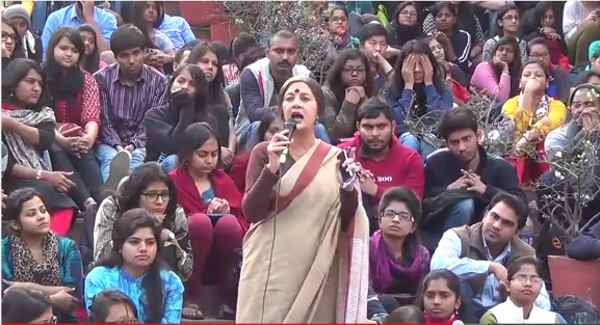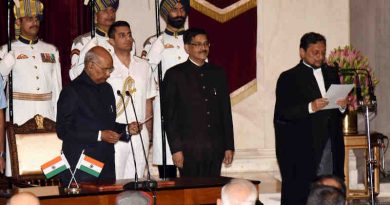Raahgiri Promotes Car-Free Living in Gurgaon

By Rakesh Raman

A community campaign that aims to educate people about the benefits of car-free living has completed one year this month in Gurgaon, a city near India’s capital New Delhi.
Christened Raahgiri (a Hindi word with ‘walking’ as its simple translation), the campaign holds weekly street events every Sunday in different parts of Gurgaon where locals participate in a slew of activities such as walking, cycling, street dancing, yoga, and aerobics.
The events are held under the slogan: “Ab Na Chalegi Motor Koi, Chalegi Sabki Raahgiri,” which means: now motorcars won’t run while everybody would walk.
The idea, according to the organizers, is to make Gurgaon accessible for its residents and encourage the use of cycling, walking, and public transport in the city.
The initiatives like Raahgiri – if supported by prudent government policies to control vehicular traffic – are earnestly needed in India where the frequency of traffic collisions is amongst the highest in the world. A National Crime Records Bureau (NCRB) report revealed that every year, more than 135,000 traffic collision-related deaths occur in india.
[ Also Read: How “Make in India” Will Break in India ]
Today, there are nearly 70 million motor vehicles in India. These include cars, commercial vehicles, motorcycles, scooters, and three-wheeler vehicles. Nearly 18 million vehicles were sold in India last year alone.
The number of vehicles are increasing at a staggering annual rate of about 20%, thanks to a plethora of car-loan schemes, unrestrained urbanization, and unaccounted money with many Indians in the absence of regulations.
For a example, car ownership is the highest at 82 per 1,000 population in a small city Chandigarh and with 54 Delhi is at No. 2 in India. This vehicle density is much higher than the national average of 41. Gurgaon, near Delhi, where Raahgiri events are being hosted accommodates most of the Delhi traffic everyday.
Raahgiri says it aims to have pedestrian- and cycling-friendly infrastructure laid over the entire city and to have safer roads for all. But that may only be a pipe dream because car population in India is increasing proportionately with the country’s population that is growing at an alarming rate and has touched nearly 1.3 billion people.
[ Also Read: 10 More Reasons I Love My Country India ]
In the absence of government policies, the events like Raahgiri will be nothing more than time-wasters for people who have plenty of time to kill in such hype-driven gatherings. Of late, Raahgiri has started holding its events in Delhi also.
Although government ministers in India are mostly uneducated and naive in the departments that they are supposed to handle, still, if they want, they can learn from the examples of an equally populated country China, which has implemented commendable policies to restrict vehicular traffic.
For example, China has implemented road space rationing in Beijing. It is a transportation demand management regulation aimed to reduce traffic by restricting automobile travel. It restricts the use of cars in Beijing, based on the last digits of the license number.
Other road space rationing regulations include the even-odd license plate policy, yellow label car policy, end-number policy and passenger car purchase policy that have been introduced in Beijing since the 2008 Summer Olympics. As a result, China has witnessed a 40% daily reduction of vehicle emissions.
[ Also Read: Disney’s Fresh Forays in China to Focus on Content ]
Moreover, there is a passenger car quota system through which a monthly license plate ‘lottery’ is carried out to randomly select the applicants who apply for buying a car in Beijing, China. One has to apply in the first week of each month while the draw happens on the 26th of the month.
Out of every 90 applicants, only one is chosen through the monthly draw of lots while the annual quota limit is 240,000 cars. The applications are received only from eligible citizens who have lived in Beijing for at least five years and paid taxes regularly. Plus, they shouldn’t own another car.
More Chinese cities like Shanghai, Guangzhou, and Guiyang have also restricted car buying through licence plate lotteries and auctions. In Shanghai, for example, where auctions are in place, a new car licence can cost up to $10,000, a price that is higher than most car models. Now it’s not easy to buy a car in China even if you have money.
There are more encouraging examples. In the U.S., for instance, the number of people who traveled to work by bike increased roughly 60% over the last decade, from about 488,000 in 2000 to about 786,000 during the 2008-2012 period.
This is the largest percentage increase of all commuting modes tracked by the 2000 Census and the 2008-2012 American Community Survey. Many U.S. cities are seeing an increase in bicycle commuters, according to a recent U.S. Census Bureau report.
Moreover, to spread awraeness about the perils of excessive car use, a Car-Free Day encourages motorists to give up their cars for a day. While September 22 is observed as the World Car-Free Day, events are organized in different parts of the world on this day to promote mass transit means, cycling, and walking.
Raahgiri in Gurgaon is one such local event that can spread awareness about the imminent dangers of increasing number of cars that run cheek by jowl on Indian roads, which are already crumbling under their weight.
By Rakesh Raman, the managing editor of RMN Company
You also can read: More Articles by the RMN Editor, Rakesh Raman
Photo courtesy: Raahgiri





